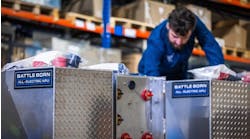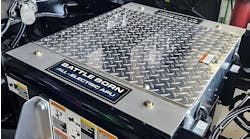That natural gas fuel has been making steady gains in the commercial vehicle segment for some time now is almost a secret success story. Natural gas vehicle (NGV) truck build rates have been slowly growing, however, and truck makers today are betting that natural gas-powered vehicles will become a larger part of the mix in the future.
In fact, natural gas could fuel millions of trucks, according to U.S. truck makers and other industry suppliers who are preparing today for the market they see emerging tomorrow. At the Mid-America Trucking Show (MATS) held in Louisville last week, and at the National NGV Fleet Summit convened just across the street, industry representatives talked about how America could expand its use of natural gas to break the bonds of dependency on foreign oil.
A panel of truck and engine makers at the NGV Fleet Summit, for instance, delivered NGV order and build rates that took many in the audience by surprise. Marty Kleker, national fleet sales manager for Peterbilt Motors Co. reported an average natural gas truck build rate of “six to eight trucks per day,” including both compressed- and liquid natural gas-powered vehicles.
Richard P. Shearing, director of product strategy for Daimler Trucks North America, said that the company already has some 7,600 natural gas-powered units on the road globally, noting that natural gas is clean, in abundant supply, renewable and good for use in a variety of applications.
Jonathan Burke, vp international development & external affairs for engine maker Westport Innovations, described the NGV market today as being at “the tipping point.” “Gas producers are entering the industry now and working to build out the supply chain,” he said. “We are planning for the big orders we think are coming.”
Kenworth Truck Co.’s national sales manager, Andy Douglas, noted that “natural gas is now a mainstream product.” “As an industry, we really believe in natural gas,” he said. “Natural gas is the technology we will see emerge as the alternative to diesel. We really believe the cost of natural gas to diesel will be the real driver.” According to Douglas, Kenworth has more than 200 orders for NG vehicles in the backlog and quotes out in the field for “well in excess of 11,000 units.”
Fuel availability has been an obstacle to the growth of natural gas vehicle deployment in the past, but even that is changing, according to the panelists. Kleker noted that there are already about 1,000 fueling stations now.
The reports from OEM and engine maker panelists helped support the message from Summit keynote speaker, T. Boone Pickens, founder and chairman of BP Capital Management. Pickens, who sees natural gas as the key to energy independence for America, noted that the United States has to end its dependence on foreign oil now or prepare to suffer the consequences of high oil prices and even scarcity in the future.


